MACBETH
by
William Shakespeare
directed by
Carl Whiteside
Performed at The Wimbledon Studio Theatre
29 May - 2 June 2001
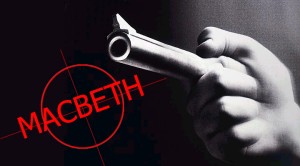
MACBETHby William Shakespeare directed by Carl Whiteside Performed at The Wimbledon Studio Theatre 29 May - 2 June 2001 |
|
 |
Directors Notes |
| The Cast | |
| The Crew | |
| Photographs | |
| Back to Productions |
 |
Director's Programme Notes |
When I was formulating my ideas for how to stage the production, I found it very difficult to visualise the play beyond the swords and armour style seen so often. Then one evening inspiration struck through a conversation about Banquo's assassination! Without wanting to spoil the scene it convinced me to use the gangster/organised crime theme due to the possible visual imagery.
The hierarchy of a Mafia family sits very close to the hierarchy of the monarchy and army generals in the play with bosses, captains, foot soldiers and so on. With recent famous films such as Lock, Stock and Two Smoking Barrels, Donnie Brasco, Goodfellas, the modern audience already possesses an understanding of each character's status in relation to each other with regard to the Mafia. This also helped myself and the cast to develop the relationships between the characters as they understood who were their rivals, who they liked, didn't like and who they had to like.
The consideration (as is unfortunately the often the case with Amateur Dramatics) was money. By setting the production in the modern day, we were able to save money on costumes and props, which is vital when you have a budget as limited as ours.
I have also kept the set to a minimum. This is because the play has a large number of short scenes. In order to allow the production maintain any continuity, I have used only two pieces of furniture - a rostrum, which allows for different levels to be used, and a bench. This has added flexibility in the staging of the scenes necessary for what is essentially theatre in the round.
For those of you in the audience currently studying the play, you will notice a large number of significant cuts to the script. Some of these were for dramatic purposes; for example the witches' spells do not ring true when they are supposed to be prostitutes. Other cuts were made due to their references e.g. to horses, Shakespearean jobs etc. Also many of the lines are describing what is happening on stage. Many of those lines were cut as the audience can see what is happening. For example, in the apparition scene, we now have various devices which allow a performer to 'disappear' on stage, which were not possible in Elizabethan Theatre.
All that's left for me to say is that I hope you find the production innovative, interesting and most importantly, entertaining!
Carl Whiteside, Spring 2001
 |
The Cast |
In Order Of Appearance
| Witch | - | Lucy Duncan |
| Witch | - | Chloe Robb |
| Witch | - | Frances Allen |
| Duncan | - | James Grayston |
| Malcolm | - | James Derbyshire |
| Ross | - | Michael Ahmad |
| Angus | - | Mark Graham |
| Lennox | - | Richard Broughton |
| Donalbain | - | Graham Parks |
| Macbeth | - | John Gargrave |
| Banquo | - | Charles Bertram |
| Lady Macbeth | - | Debbie Fowler |
| Servant, Guest | - | Alison Raffan |
| Macduff | - | Matthew Petty |
| Lady Macduff | - | Sue Lovelace |
| Porter, Seyton | - | Dylan Geoghegan |
| Servant, Guest, Messenger | - | Val Foskett |
| Doctor, Guest | - | Christina McIntyre |
| Fleance | - | Richard Hollis |
| Mentieth, Lord, Bouncer | - | Ian Ward |
| Murderer, Guest | - | Ruth Brooks |
| Murderer, Caithness | - | Rory Murnagh |
| Murderer, Young Siward | - | Steve Ogbonna |
| Macduff's Daughter | - | Lizzie Moss |
| Gentlewoman | - | Kathie Arundell |
| Siward | - | Vincent Lewer |
| Apparition voices | - | Christopher Moss, Lizzie Moss, Elizabeth Hawes, Charles Bertram, Frances Allen, Lucy Duncan |
 |
The Crew |
| Stage Manager | - | Ruth Brooks |
| Props | - | Georgina Gorham |
| Sound | - | Simon Harris |
| Lighting | - | Sarah Hewitt |
| Publicity | - | James Derbyshire, Kristen Bowditch |
| Programme Design | - | Kristen Bowditch |
| Front of House | - | Penny Stone and Friends |
| Photography | - | Kristen Bowditch |
 |
Photographs |
Click on any image to see a larger version
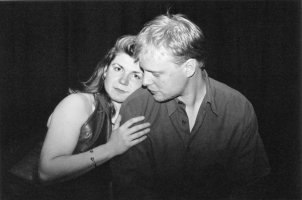
The Macbeths in happier times.
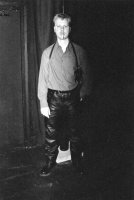
Macbeth, newly appointed Thane of Cawdor.
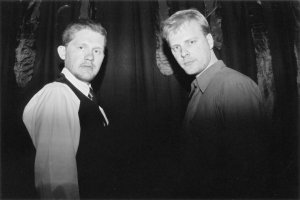
Macbeth and Banquo discuss the predictions they have witnessed.
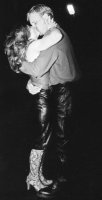
Macbeth Thane of Cawdor, returns home triumphant, and is greeted by Lady Macbeth.
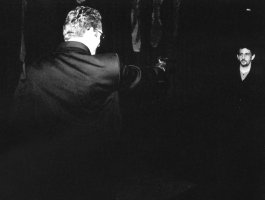
But when Duncan is murdered, suspicion and mistrust run rife. Duncan's favoured heir Malcolm confronts Ross.
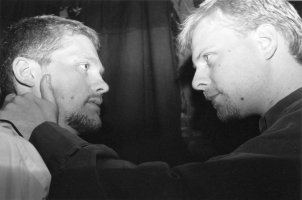
Banquo meets Macbeth before the banquet - he will never make it alive.
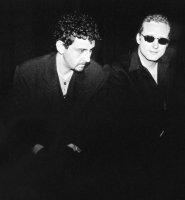
Ross and Malcolm ponder the tragedy, and the future.
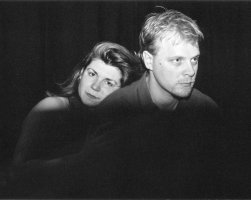
Macbeth's guilt begins to tear him and Lady Macbeth apart.
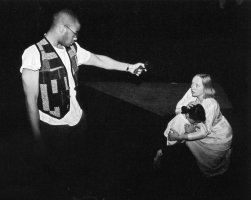
In a petulant rage, Macbeth sends an assassin to kill Lady Macduff and her daughter.
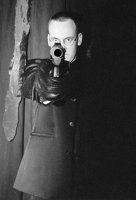
Upon hearing of the slaughter of his family, Macduff swears vengeance on Macbeth.
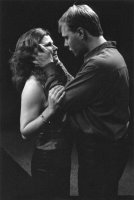
The Macbeths struggle to keep calm under the pressure...
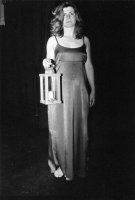
...but Lady Macbeth slips into madness.
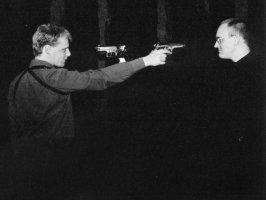
During the storming of Macbeth's base by Malcolm's gathered troops, Macduff and Macbeth finally come face to face.
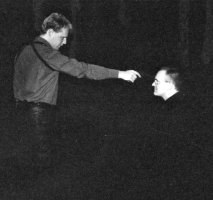
Macbeth seems to have the upper hand - but for how long?